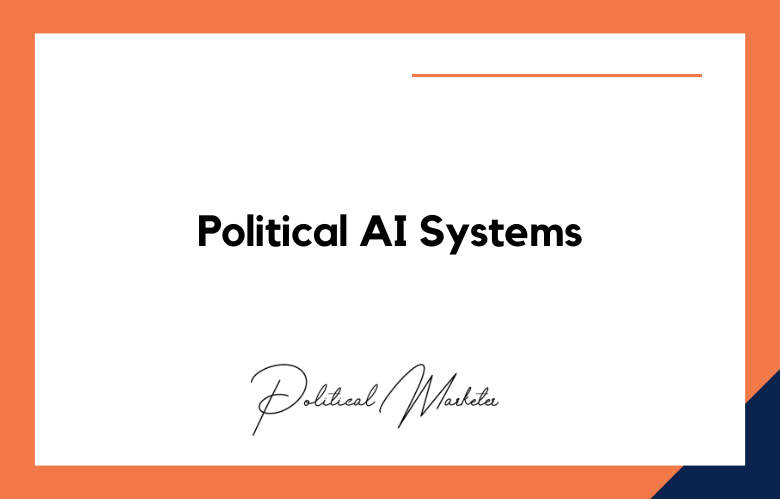With Artificial Intelligence (AI) and digital technologies, modern political campaigns have transformed to reach voters in interactive and personalized ways. In AI-driven political campaigns, massive amounts of data are collected from social media platforms, email inboxes, phone logs, and internet searches to create personalized advertisements and targeted messages.
However, this heavy reliance on digital technologies and AI also poses significant challenges to protecting the data privacy of individuals. In this, we will explore how AI-driven political campaigns can threaten our data privacy and what measures can be taken to address this issue.
Protecting Data Privacy in AI-Driven Political Campaigns
Data Privacy Concerns:
AI-driven political campaigns collect data from individuals through various channels, including social media profiles, web-ad browsing history, purchases, location data, and mobile phone IDs.
This data is then used to create a personalized user profile, harnessed to micro-target individuals with political messaging and advertising. While this customized targeting may seem beneficial, it can also lead to ethical and legal concerns if the data collected is inaccurate or shared with third parties without individual consent.
Legal Frameworks:
Regulatory frameworks have been established in many countries to safeguard individual data privacy rights. For example, the European Union’s General Data Protection Regulation (GDPR), which went into effect in 2018, mandates that organizations obtain explicit consent from individuals before using their data and adhere to specific data security standards. The United States, however, lacks a comprehensive and coherent federal privacy law. Currently, data protection laws vary from state to state in the US.
Transparency and Accountability:
Transparency and accountability are crucial to data privacy protection in AI-driven political campaigns. Campaign organizations and political parties must make clear and concise policies regarding data collection, usage, storage, and disposal. They should also be accountable to users, regulators, and other stakeholders for protecting user privacy. This becomes important as it serves as a deterrent to the misuse of personal data.
Cybersecurity:
In AI-driven political campaigns, cybersecurity challenges should not be overlooked. As campaigns increasingly rely on digital technologies, cyber threats become more significant. Adversaries can hijack or steal data, manipulate public opinion, and sabotage campaign infrastructure. Cybersecurity best practices must be implemented for data protection to mitigate these risks.
Data ensuresene:
Effective data governance ensures that organizations maintain privacy and security standards and provide accountability for using and disposing of personal data. Organizational policies, procedures, training, and technical solutions should be implemented to support data governance. An effective cyber hygiene program can go a long way toward security and protection from cyber threats.
Behind the Curtain: Safeguarding Data Privacy in AI-Powered Political Campaigns
In recent years, political campaigns have increasingly relied on artificial intelligence (AI) algorithms to target voters better and tailor their messaging. While this technology can offer campaigns valuable insights into voter behavior and preferences, it also presents a significant risk to individuals’ data privacy.
As political campaigns collect vast amounts of data on voters, they can use AI algorithms to create highly personalized profiles that reveal a wealth of personal information, including age, income, political affiliation, and even private beliefs. This information can then be used to create targeted ads and messaging specifically designed to appeal to individual voters.
Securing Democracy: Ensuring Data Privacy in AI-Driven Political Campaigns
Artificial intelligence (AI) has recently become increasingly popular and widespread in political campaigns. Political organizations now use AI-powered tools to mine data from various sources, such as social media platforms and digital footprints, to gather valuable insights about voter preferences, behaviors, and habits. While this can be advantageous in making informed decisions and creating targeted campaign strategies, it also comes with the risk of compromising data privacy.
The misuse of personal data during political campaigns can have serious consequences. It can lead to the spread of fake news, fraudulent activities, and other forms of digital manipulation that can sway elections. In addition, the lack of transparency and accountability in how political organizations use AI to collect and process data can erode trust in democratic institutions and jeopardize the integrity of the democratic process.
The Cryptographers’ Dilemma: Balancing Data Privacy and Political Campaigns in the Age of AI
In the digital age, data privacy has become a significant concern. With the rise of artificial intelligence (AI) and machine learning (ML), personal data privacy has become increasingly vulnerable to exploitation. This dilemma is particularly acute in political campaigns, where sensitive personal data can be used to manipulate public opinion and sway election outcomes.
Cryptographers play a crucial role in addressing this dilemma. They utilize encryption techniques to safeguard personal data from unauthorized access and misuse. However, in political campaigns, cryptographers must distinguish between protecting individual privacy and enabling democratic participation.
Data Armor: Fortifying Privacy in AI-Backed Political Campaigns
With the rise of artificial intelligence (AI) in political campaigns, concerns about data privacy have become more prominent than ever before. In recent years, political campaigns have increasingly used AI-backed techniques to gather voters’ data and target specific demographics with tailored messaging. However, this use of AI also raises questions about the ethical implications of voter data collection and the potential for misuse of this data by political campaigns.
One solution to these concerns is developing “Data Armor” technology, which fortifies privacy in AI-backed political campaigns. Data Armor is a set of practices and tools designed to protect the privacy of individuals participating in political campaigns. This technology includes encryption, data minimization, and anonymization techniques that prevent political campaigns from collecting unnecessary personal information.
Privacy Paranoia: Addressing Concerns in AI-Powered Political Campaigns
Another concern is the potential for AI algorithms to amplify existing social biases and inequalities. AI-powered campaigns may inadvertently reinforce patterns of discrimination and disenfranchisement by targeting specific demographics or perpetuating stereotypes and prejudices.
To prevent this from happening, political campaigns must be mindful of the data they collect and the algorithms they use. They must ensure that their data sources are diverse and representative and that their algorithms are regularly audited for unintended biases or discriminatory outcomes.
While AI-powered political campaigns may offer new possibilities for engagement and outreach, they must be conducted ethically and transparently. Addressing privacy concerns and ensuring the responsible use of AI technology must be a top priority for political campaigns and policymakers alike.
Unmasking the AI: Preserving Data Privacy Amidst Political Campaigns
As political campaigns ramp up their efforts to win over their target audience, the role of Artificial Intelligence (AI) in shaping voter decisions and preferences has become increasingly prevalent. However, with the advent of AI, questions about data privacy and security have emerged, calling for stringent regulation to ensure that personal data remains protected.
One primary concern about AI in political campaigns is how much it can mine personal data. AI tools can gather personal information from various sources, including social media profiles, browsing history, and online purchasing behavior. This data can create a detailed individual profile, allowing for highly targeted political advertising.
Privacy by Design: Nurturing Data Protection in AI-Driven Political Campaigns
Data is a valuable resource in the digital age and is often considered the future currency. Political campaigns have not been left out of this revolution, and using AI-powered technologies has become the norm in many developed countries. However, with the increasing use of advanced data analytics and algorithmic techniques, privacy concerns have emerged as a significant challenge for political campaigns. The need for privacy by design has become crucial to ensure accountability and transparency in AI-driven political campaigns.
Privacy by design is a principle that promotes integrating privacy and data protection into the design of technology and processes rather than treating it as an add-on after the development phase. In the context of political campaigns, privacy by design is an approach that seeks to ensure that all considerations for data privacy and protection are incorporated into the technology solutions used in political campaigns.
Conclusion:
Data privacy protection in AI-driven political campaigns requires a comprehensive approach involving the legal framework, transparency, accountability, cybersecurity, and effective data governance. Even more importantly, it is the responsibility of political parties, candidates, and their supporters to take accountability to safeguard individuals’ data privacy rights.
As campaigns grow in scale and complexity, it is necessary to ensure that individuals are not unknowingly putting their data into malicious actors’ hands or campaigns without explicit consent. Therefore, by adopting a comprehensive privacy-protection strategy, organizations can ensure responsible data use, maintain public trust, and protect individual privacy rights.
Call: +91 9848321284
Email: [email protected]
Protecting Data Privacy in AI-Driven Political Campaigns: FAQs
What Is Data Privacy In The Context Of AI-Driven Political Campaigns?
It refers to the ethical and legal handling of voter data collected, processed, and analyzed through AI tools during political campaigns.
Why Is Data Privacy Crucial In Political Campaigns Using AI?
AI-driven tools rely on massive datasets, including personal information, and mishandling this data can result in privacy breaches, legal action, and loss of voter trust.
How Do Political Campaigns Collect Voter Data?
Campaigns gather data through surveys, social media interactions, website behavior tracking, voter databases, third-party data providers, and public records.
Can AI Compromise Voter Privacy If Not Used Responsibly?
Yes. If privacy safeguards are not in place, AI can unintentionally expose sensitive information, create unauthorized voter profiles, or be used for manipulation.
What Are The Legal Risks Of Mishandling Voter Data?
Violations of data protection laws, such as GDPR or India’s DPDP Act, can result in fines, campaign penalties, and reputational damage.
How Can Campaigns Ensure AI Compliance With Data Privacy Laws?
By implementing strong data governance frameworks, seeking user consent, anonymizing data, and working with privacy-focused AI vendors.
What Is Data Minimization And Why Is It Important?
Data minimization means collecting only the data necessary to achieve campaign goals, reducing the risk of overreach and privacy violations.
Are Voters Aware Of How Their Data Is Used In AI Campaigns?
Often not. Many voters do not know how extensively their data is harvested and profiled, which makes transparency and informed consent essential.
How Can Campaigns Build Trust Around Data Usage?
By publishing clear privacy policies, offering opt-outs, disclosing data sources, and being transparent about how AI is used in outreach.
What Role Do AI Vendors Play In Data Privacy?
Vendors supplying AI tools must follow strict compliance practices and be transparent about their data collection, storage, and processing methods.
Should Political Campaigns Use Encrypted Data Storage?
Yes. Encrypting data ensures that the information remains inaccessible to unauthorized parties even if there is a breach.
What Is Consent Management In AI-Powered Campaigns?
Consent management involves obtaining explicit, verifiable permission from individuals before collecting or processing their data.
Can AI Be Used To Predict Voter Behavior Without Violating Privacy?
If data is anonymized and aggregated, AI can make behavioral predictions while protecting individual identities.
How Do Political Campaigns Handle Third-Party Data Privacy Risks?
By vetting third-party vendors, setting contractual privacy obligations, and ensuring that no unauthorized data sharing occurs.
What Happens If Voter Data Is Breached During An AI Campaign?
Campaigns must notify affected individuals and regulators and take immediate steps to mitigate the damage and prevent future breaches.
Is It Ethical To Use AI For Microtargeting Voters?
Ethics depend on transparency, consent, and fairness—while effective, microtargeting can cross ethical lines if used for manipulation.
How Can AI Be Used To Detect Data Privacy Violations In Campaigns?
AI tools can audit access logs, detect anomalies, monitor compliance, and flag potential data misuse in real time.
What Are Privacy-By-Design Principles In Political Tech?
Integrating privacy features like access controls, encryption, and consent layers into AI tools and campaign workflows.
Do Data Privacy Regulations Vary Between Countries?
Yes. Different regions have different laws, such as GDPR in the EU, CCPA in California, and India’s Digital Personal Data Protection Act.
What Should Be Included In A Campaign’s Data Privacy Policy?
It should cover what data is collected, its use, who it’s shared with, data retention periods, user rights, and contact info for privacy concerns.










